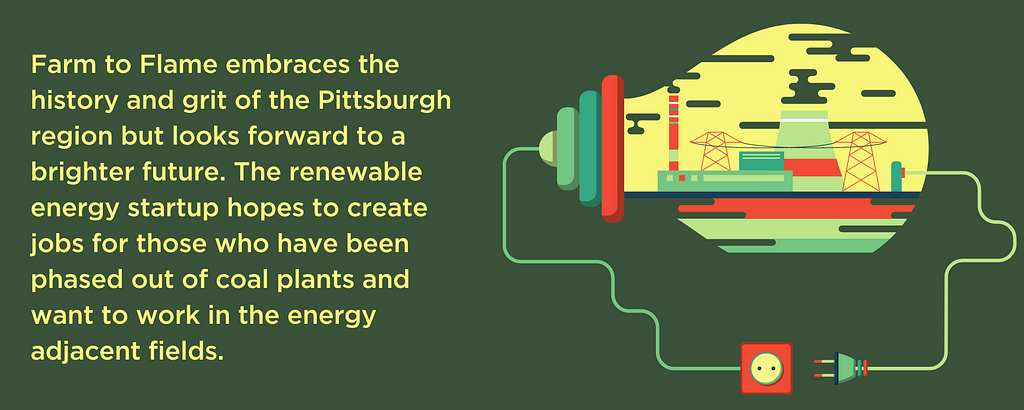Ascender Incubator Alumni Success Story

Pittsburgh-based renewable energy startup and Incubator alumni company Farm to Flame Energy recently announced a $4.4 million combined heat and power purchase agreement with a Vermont furniture company.
“We’re very excited about this contract as it’s a 20-year contract, and it shows the long-term growth trajectory that Farm to Flame has,” explained Kwaku Jyamfi (KJ), the company’s CEO & co-founder.
As a cleantech company launched in 2018, Farm to Flame offers a scalable 10–30KW generator that utilizes multiple plant-based feedstocks for smokeless and odorless electricity generation.
When KJ was younger, he was deeply interested in water treatment, especially in developing nations and areas with heavily polluted bodies of water.
“If you want to understand water treatment, you also have to understand that energy is a nexus to water treatment. You need energy sources to properly filtrate your water, have clean drinking water, and even have clean wastewater,” said KJ.
“So, I thought this was a very good opportunity to take a carbon-neutral electricity solution and apply it to something that could not only help in areas of water treatment but in every municipal aspect of our everyday lives.”
![“[Diesel generators] are terrible for the environment and the smoke that comes off of them is also really bad for people’s health — diesel exhaust fumes kill over 21,000 people per year.” -KJ, CEO of Farm to Flame](https://cdn-images-1.medium.com/max/1024/1*wBOZ2xi5UEAjtJAJhL5OEw.png)
FROM COAL TO CARBON NEUTRAL
According to KJ, approximately 21,000 people die prematurely each year due to particulate matter pollution from burning diesel, a common fuel for electric generators.
When he saw just how clean the combustion process was for Farm to Flame’s prototype generator, KJ knew he and his team were on to something.
“I knew we had a competitive advantage on other biomass-to-electricity solutions that typically use variable grade and impure feedstocks, which lead to longer generator downtimes,” said KJ. “So not only is [our generator] a big social impact solution, but it’s also a technological solution that bears greater financial return.”
“We’re really excited about taking our technology, which is actually adjacent to pulverized coal, and using it, along with existing boilers and steam turbines, to generate electricity with the same thermal efficiency as pulverized coal,” KJ said, “But it’s carbon neutral, and it’s more cost-effective.”
Farm to Flame has a goal of 4 Gigawatts by 2032, which is over $10 billion in carbon-neutral electricity assets, displacing over 21 million tons of carbon dioxide from diesel generators and fossil fuels.
A PITTSBURGH COMPANY THROUGH & THROUGH
“I love Pittsburgh. Pittsburgh is the place where we built the very first demonstration unit,” said KJ. “And we actually built it on my apartment porch during my time in graduate school at Carnegie Mellon.”
“We generated electricity with five different fuels. And after I graduated, it actually helped us get an SBIR grant from the US EPA to build the real generator and acquire this equipment.”
Farm to Flame has outgrown the grad school porch and now manufactures its generators along the Monongahela River in Duquesne.
As he provided a tour of the startup’s manufacturing space, KJ noted that coal was being transported directly behind the building on its way to Kentucky for electricity generation. “Pittsburgh is a very strategically important community for clean energy. A lot of what we’ve seen here historically is a large coal, industrial movement,” stated KJ.
Farm to Flame embraces the history and grit of the region. Still, it looks forward to a brighter future where the company is recognized globally as a leader in the carbon-neutral and biomass energy fields.
The company hopes also to generate more than just electricity. KJ noted, “We can also create jobs for those who have maybe phased out of coal plants and are looking to work in the energy adjacent fields.”

STOKING THE FLAMES FOR SUCCESS
Local institutions like Carnegie Mellon, Kiva Pittsburgh, and the Richard King Mellon Foundation have supported Farm to Flame along their journey, as well as the Ascender community.
During their time in Ascender’s 2020–2021 Incubator, the team participated in the PGH Lab program to pilot their idea with the City of Pittsburgh, developed partnerships with the Pennsylvania State Department of Agriculture, and applied and won a $100K SBIR NSF Grant with help from the Ascender team.
“I’m so grateful for the Ascender Incubator program. The yearlong program helped me navigate the challenges every early-stage company faces. It also pushed Farm to Flame Energy to grow our idea during the pandemic and ultimately launch our first commercial generator,” commented KJ.
Since graduating from the Incubator, Farm to Flame has raised more than $2M, signed a contract to deploy a commercial unit to Think and Grow Farms Greenhouse in New Jersey, and continues onboarding additional partners eager to deploy their generators.
You can support Farm to Flame by contributing to its WeFunder campaign—the company’s already raised more than half its $600,000 goal—or by connecting with the team at ftfenergy.com.
Connect with us
Learn more about Ascender: https://ascenderpgh.com/
Sign up for our newsletter or send us a note: info@ascenderpgh.com
Follow us: Twitter — Facebook — LinkedIn — Instagram
From fledgling tech companies, healthcare innovators, and nonprofits to makers, creators, services and shops, Ascender is for Pittsburgh’s entrepreneurs. We help businesses of all types in the Pittsburgh region start and build a business through education and connectivity. See how Ascender can help you.
Farm to Flame Energy Inks $4.4M Purchase Agreement was originally published in Ascender on Medium, where people are continuing the conversation by highlighting and responding to this story.

